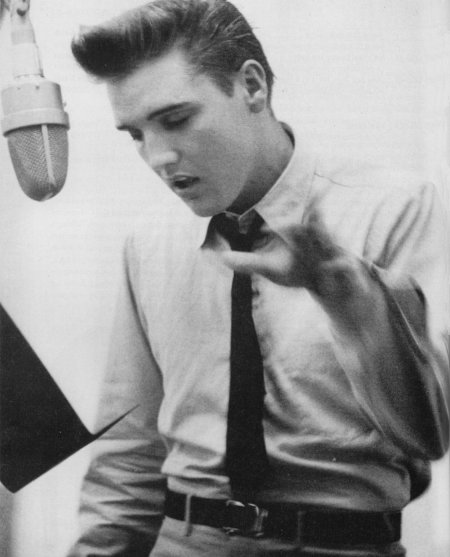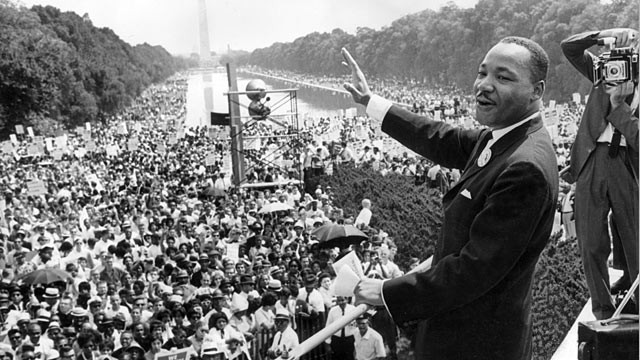The American War of Independence in the late 18th century was fought to free the American people from the yoke of English government, under a mad King of America, George III. Nearly 200 years later came another known as The King: Elvis Presley. Elvis’s life, I believe, can used as a metaphor for the USA itself.
Elvis’s Life: The Story of the USA
Elvis was born on the wrong side of the tracks and was brought up in a poor neighbourhood. He was exposed to musical influences reflecting the ethnic diversity of the USA: country, gospel and R&B. The young Elvis recorded songs at the legendary Sun studios in 1954-5 that blended these styles with a freshness and energy that was truly revolutionary to mainstream (white) audiences. It was he that brought the raw energy of rock’n’roll to a wider public. (Yes, I know Bill Haley was the first to have a rock’n’roll chart hit. But Haley brought a less threatening, more country orientated style with cleaned up lyrics. Check out the real deal by listening to the original version of Shake, Rattle and Roll by Big Joe Turner, in all its gruesomely – to modern ears – glorious misogyny.)

The young Elvis can be seen as a metaphor for a relatively young country with all the energy and expectation you would expect from the diverse range of people who moved there to forge a new life.
Later Years
A year or two later, there now enters the villain of the story, Presley’s manager Colonel Tom Parker. He saw the commercial potential of the young Elvis and soon changed him from a raw, threatening teenage idol into a mainstream entertainer. This transformation, reinforced by Presley’s conscription, gradually sapped the energy and the excitement of his performances. Parker can easily be seen as a metaphor for American corporate capitalism at its worst. Parker’s approach reduces real talent to a commodity to be exploited and a predictable, standardised product. Fans become consumers.
This process reaches a nadir with the Las Vegas concerts. An overweight Presley in lurid, tasteless costumes badly performed old hits and family-friendly numbers. It was cruel caricature of the streak of lightning from his early days. His poor diet and consumption of prodigious quantities of prescription drugs led to a major health deterioration and early death at the age of only 42 years. This sorry tale has its counterpart in the story of the USA. Over-consumption, obesity and a profit-driven health system – recently rated as the worst value for money in the world by a UN agency. And, not surprisingly, a shorter life expectancy that other western countries, including the UK.
The USA, with its fine, inspiring written constitution started full of promise and energy. It welcomed the “tired, poor and huddled masses” to build something to be proud off. Slowly, starting with the robber barons of the late 19th century, it all started to go wrong. The steady, cancerous corruption of public and political life through the overarching power of the dollar and of corporate lobbying got us to the sorry state we’re in today. Americans are taught from an early age to be consumers, not citizens. Hence the obesity, the rip-off healthcare and poor health outcomes. The parallels with Presley’s life are striking.
The Comeback Show 1968
After the early promise, for Elvis it was mostly downhill all the way. One bright exception to this trend was a US TV show in 1968, the Comeback Special. The show included edited extracts from 2 semi-improvised live sessions. Elvis was joined by his old supporting musicians from the original Sun Records days. Appearing his most relaxed for years, they joked and reminisced and jammed their way through his back catalogue and some rock’n’roll classics.

The show ended with a song written by Walter Earl Brown for the occasion, If I Can Dream. It speaks of hope for the oppressed and brotherly love. Playing the pantomime villain role, Parker didn’t want to use it, but Elvis disagreed. I remember at the time immediately and instinctively liking the song. But for nearly fifty years since, I have put it in the category of “guilty pleasure”. The lyrics are a bit cheesy and the arrangement almost too perfect, too polished.
In the wake of the recent awful news events, I was reminded of the song and played it again. I also found out that the lyrics include quotations from speeches by the third King of America in our tale: civil rights campaigner Martin Luther King. The TV show was recorded two months after King’s assassination and Presley wanted something appropriate to conclude the show.

I now find that those erstwhile clunky lyrics speak to me about what I’m trying to say. My previous guilt has gone and I’m an “out and proud” lover of the song. Right now we need a political leader, or leaders, to articulate the thoughts captured in the song and to find a way of making them happen.
In the meantime, if you don’t know the song or haven’t heard it for a while, check it out. Use it as balm for the soul or to reignite your energies. Elvis belts out those words with force and a passion we’d thought had been lost in the lean years. So, give it a play, and whatever you do, play it very LOUD!
Out there in the dark, there’s a beckoning candle…